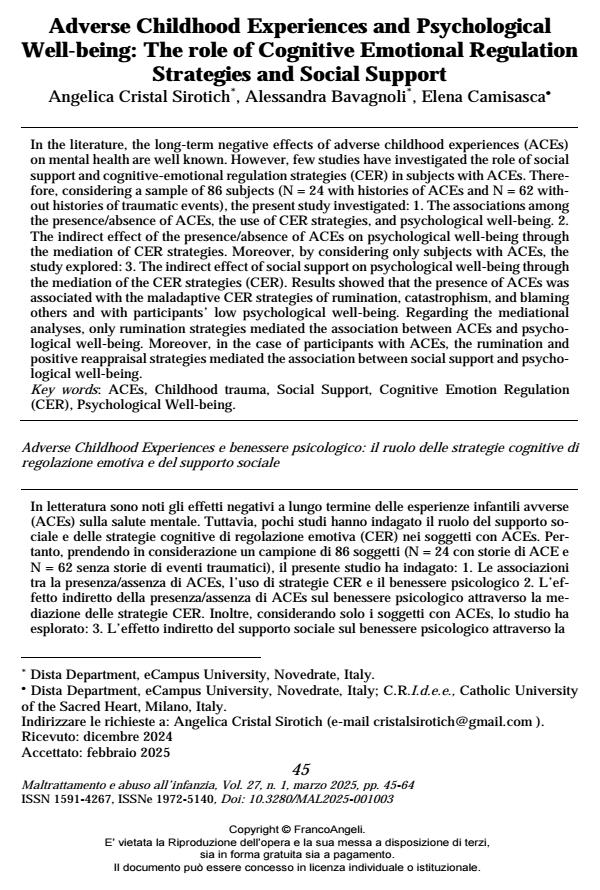Adverse Childhood Experiences and Psychological Well-being: The role of Cognitive Emotional Regulation Strategies and Social Support
Journal title MALTRATTAMENTO E ABUSO ALL’INFANZIA
Author/s Angelica Cristal Sirotich, Alessandra Bavagnoli, Elena Camisasca
Publishing Year 2025 Issue 2025/1
Language English Pages 20 P. 45-64 File size 164 KB
DOI 10.3280/MAL2025-001003
DOI is like a bar code for intellectual property: to have more infomation
click here
Below, you can see the article first page
If you want to buy this article in PDF format, you can do it, following the instructions to buy download credits

FrancoAngeli is member of Publishers International Linking Association, Inc (PILA), a not-for-profit association which run the CrossRef service enabling links to and from online scholarly content.
In the literature, the long-term negative effects of adverse childhood experiences (ACEs) on mental health are well known. However, few studies have investigated the role of social support and cognitive-emotional regulation strategies (CER) in subjects with ACEs. Therefore, considering a sample of 86 subjects (N = 24 with histories of ACEs and N = 62 without histories of traumatic events), the present study investigated: 1. The associations among the presence/absence of ACEs, the use of CER strategies, and psychological well-being. 2. The indirect effect of the presence/absence of ACEs on psychological well-being through the mediation of CER strategies. Moreover, by considering only subjects with ACEs, the study explored: 3. The indirect effect of social support on psychological well-being through the mediation of the CER strategies (CER). Results showed that the presence of ACEs was associated with the maladaptive CER strategies of rumination, catastrophism, and blaming others and with participants’ low psychological well-being. Regarding the mediational analyses, only rumination strategies mediated the association between ACEs and psychological well-being. Moreover, in the case of participants with ACEs, the rumination and positive reappraisal strategies mediated the association between social support and psychological well-being.
Keywords: ACEs, Childhood trauma, Social Support, Cognitive Emotion Regulation (CER), Psychological Well-being.
Angelica Cristal Sirotich, Alessandra Bavagnoli, Elena Camisasca, Adverse Childhood Experiences and Psychological Well-being: The role of Cognitive Emotional Regulation Strategies and Social Support in "MALTRATTAMENTO E ABUSO ALL’INFANZIA" 1/2025, pp 45-64, DOI: 10.3280/MAL2025-001003